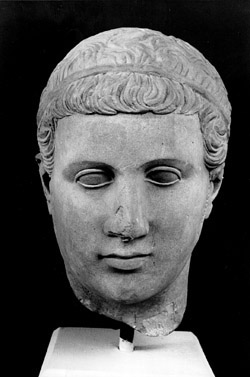|
 Not much more is known about Diagoras of Melos (for
lack of any information on the matter, I estimate his year of flourishing
to 400 BC, which should only be seen as an approximation), than that he
was called atheist – probably not only in the meaning ‘ungodly' of that
word. Athenagoras said about him, that he "made the downright assertion
that god does not exist at all." Cicero states the same about him. Cicero
also tells of how a friend of Diagoras tried to convince him of the
existence of the gods, by pointing out how many votive pictures tell about
people being saved from storms at sea by "dint of vows to the gods", to
which Diagoras replied that "there are nowhere any pictures of those who
have been shipwrecked and drowned at sea." And Cicero goes on to give
another example, where Diagoras was on a ship in hard weather, and the
crew thought that they had brought it on themselves by taking this ungodly
man onboard. He then wondered if the other boats out in the same storm
also had a Diagoras onboard.
Not much more is known about Diagoras of Melos (for
lack of any information on the matter, I estimate his year of flourishing
to 400 BC, which should only be seen as an approximation), than that he
was called atheist – probably not only in the meaning ‘ungodly' of that
word. Athenagoras said about him, that he "made the downright assertion
that god does not exist at all." Cicero states the same about him. Cicero
also tells of how a friend of Diagoras tried to convince him of the
existence of the gods, by pointing out how many votive pictures tell about
people being saved from storms at sea by "dint of vows to the gods", to
which Diagoras replied that "there are nowhere any pictures of those who
have been shipwrecked and drowned at sea." And Cicero goes on to give
another example, where Diagoras was on a ship in hard weather, and the
crew thought that they had brought it on themselves by taking this ungodly
man onboard. He then wondered if the other boats out in the same storm
also had a Diagoras onboard.
According to
Sextus Empiricus he became an atheist when an enemy of his perjured
himself in court and got away with it. There are some variations in other
sources to this anecdote, though not changing its moral content –
immorality seems to go unpunished, so how can there be any gods in the
sense of watchers over human virtue?
He is
said to have been a student of Democritus, who may have initiated his
disbelief in the existence of the gods, and was expelled from Athens in
411 BC for his attacks on religion. Other sources claim that he was bought
from slavery by Democritus in 411 BC, when Melos was captured by
Alcibiades, and then became his student.
Literature
Barnes, Jonathan, The Presocratic
Philosophers, volume 2, London 1979.
Cicero, De natura
deorum, 1.2, translated by H. Rackham, Loeb, London 1979.
Freeman,
Kathleen, The Pre-Socratic Philosophers, Oxford 1946.
© Stefan Stenudd 2000
|
 Not much more is known about Diagoras of Melos (for
lack of any information on the matter, I estimate his year of flourishing
to 400 BC, which should only be seen as an approximation), than that he
was called atheist – probably not only in the meaning ‘ungodly' of that
word. Athenagoras said about him, that he "made the downright assertion
that god does not exist at all." Cicero states the same about him. Cicero
also tells of how a friend of Diagoras tried to convince him of the
existence of the gods, by pointing out how many votive pictures tell about
people being saved from storms at sea by "dint of vows to the gods", to
which Diagoras replied that "there are nowhere any pictures of those who
have been shipwrecked and drowned at sea." And Cicero goes on to give
another example, where Diagoras was on a ship in hard weather, and the
crew thought that they had brought it on themselves by taking this ungodly
man onboard. He then wondered if the other boats out in the same storm
also had a Diagoras onboard.
Not much more is known about Diagoras of Melos (for
lack of any information on the matter, I estimate his year of flourishing
to 400 BC, which should only be seen as an approximation), than that he
was called atheist – probably not only in the meaning ‘ungodly' of that
word. Athenagoras said about him, that he "made the downright assertion
that god does not exist at all." Cicero states the same about him. Cicero
also tells of how a friend of Diagoras tried to convince him of the
existence of the gods, by pointing out how many votive pictures tell about
people being saved from storms at sea by "dint of vows to the gods", to
which Diagoras replied that "there are nowhere any pictures of those who
have been shipwrecked and drowned at sea." And Cicero goes on to give
another example, where Diagoras was on a ship in hard weather, and the
crew thought that they had brought it on themselves by taking this ungodly
man onboard. He then wondered if the other boats out in the same storm
also had a Diagoras onboard.